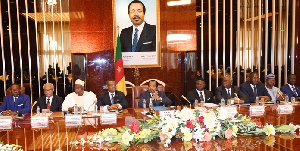With the 1st edition of the specialized technical committee (STC) meeting on social development, labor and employment, African officials are deliberating on ways of addressing challenges in the area of social protection on the African continent.
The Meeting has been organized on 20-24 April by the Department of Social Affairs of the African Union Commission (AUC) under the theme, "Social Protection for Inclusive Development," at the AU Headquarters in Ethiopia's capital Addis Ababa.
The meeting dwells upon ways of addressing challenges faced by women in African labor markets, and discusses appropriate and bold measures to improve the status of women in labor markets, as well as their social protection needs.
It considers the first five-year priority programme for implementation of the January 2015 AU Assembly declaration and plan of action on employment, poverty eradication, and inclusive development.
The meeting deliberates on ways of addressing other challenges facing vulnerable groups, including expansion of social protection systems to combat poverty and exclusion, as well as to establish synergies among the social development, labor and employment sectors to enable the joint operationalization of the specialized technical committee.
The social impact of Ebola in general and on the nature of social protection interventions required for the most affected countries is also on the agenda of the meeting, according to AU.
Speaking at the opening of the ministerial session on Thursday, Mustapha S. Kaloko, AU Commissioner for Social Affairs, noted that Africa lags behind other world regions on the four basic pillars of social protection including, essential healthcare for all; income security for children & families; income security for women& men in working age; and income security for older persons.
"The most important policy gap on social insurance, concerns the informal economy and rural workers who make up approximately 80 percent of the labor force in the continent," said the Commissioner.
"We must acknowledge that the informal and rural occupations, open up large avenues for a mix of contributory and non- contributory social protection regimes in our countries," he said.
"The challenge is further amplified by the demographic dividend of the continent, meaning that we don't have the largest proportion of adults to contribute to social security," he added.
Main constraints that limit achievements on social protection in Africa include among others, challenges of coordination, fiscal space and funding, governance, institutional capacity, monitoring and evaluation, participation of stakeholders and beneficiaries, knowledge and statistics, political will and vision embracing social protection for all, according to the Commissioner.
Chairing the two-day ministerial session on 23-24 April, Zimbabwe's Minister of Public Service, Priscah Mupfumira, reiterated that scourge of unemployment, war and disease have continued to affect people of Africa.
"In this context, the cost of these ills should be mitigated through our various policies, programmes and activities," underlined the Minister.
Opinions of Saturday, 25 April 2015
Auteur: Xinhuanet















